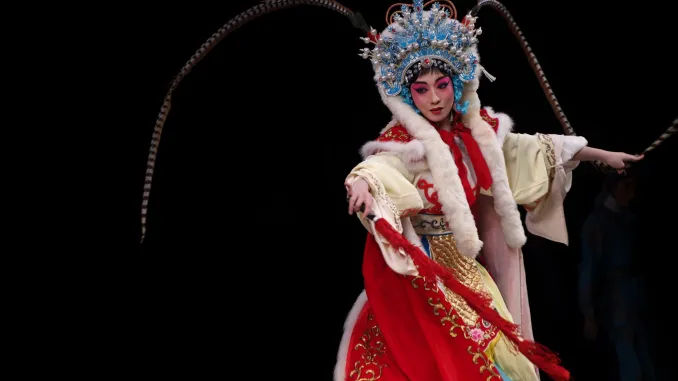The stories that make up Peking Opera come from the history of China, and encompass tales from the dynasties, ancient events, and testimonies approximately emperors, ministers, and exquisite ladies, and some no longer so authentic money owed from literature.
Some of the traditional performs written during the Qing duration should infrequently be accomplished these days as lots of them include extra than 24 acts, in order that to rehearse them would take years and to degree them would take several days.
Nowadays, Peking Opera audiences are supplied with a focused version, a one-act performance of a play that was initially lots longer, containing the spotlight of the drama which people in no way get uninterested in looking.
These are a few classics which can be nevertheless famous with audiences today.
Farewell My Concubine Zhaojun Chu Sai Peking Opera
It is also every so often seen with the identify Ba Wang Bie Ji 霸王别姬, better translated as The Hegemon-King Bids his Concubine Farewell, or Farewell to Princess Yu.
The story is ready Xiang Yu, who favored to be referred to as the “Hegemon King of Western Chu”, as he battled for the unification of China in opposition to Liu Bang, who later based the Han Dynasty. In the play, Xiang Yu is surrounded by using Liu Bang’s forces and at the verge of overall defeat, so he calls to his horse and pleads with it to run away for its personal protection.
The horse refuses, and he then calls for the employer of his favourite concubine, Consort Yu. Realizing the dire state of affairs that has befallen them, she begs to die alongside her master, however he strongly refuses this want. Afterwards, as he is distracted, Yu commits suicide with Xiang Yu’s sword.
Drunken Beauty
Zhaojun Chu Sai Peking Opera: Gui Fei Zui Jiu 贵妃醉酒
You may see this story billed as Gui Fei Zui Jiu 贵妃醉酒, or Drunken Princess. This classic was an opportunity for Mei Lanfang, as the Princess, to reveal off his super appearing and acrobatic capabilities.
The tremendously stunning Yang Yuhuan became the favorite concubine, out of three,000, of the Emperor Ming, and one evening had organized to satisfy with him for a drink in the One Hundred Flower Pavilion.
However, the Emperor we could her down, going alternatively to some other Princess. Assisted via two Eunuchs, the princess starts offe volved ingesting on my own, getting increasingly more drunk and unhappy. The target audience is entranced looking the gestures and smart antics of the drunken concubine.
The Heavenly Maid Scatters Blossoms
Zhaojun Chu Sai Peking Opera: Tian Nu San Hua 天女散花
This play is also referred to as Tian Nu San Hua 天女散花, translated as Sylph Scattering Flowers, or A Fairy Maiden Scatters Flowers. In the story, the Buddha orders the heavenly maid to scatter blossoms in Vimalakirti Nirdesa’s room so as to test his faith. The heavenly maid scatters the blossoms in front of him and declares the Buddha’s words earlier than she returns to the west.
Lady Wang Zhaojun Goes Beyond the Frontier
Beijing Opera Lady Wang Zhaojun Goes Beyond the Frontier (Zhao Jun Chu Sai 昭君出塞) is the latter a part of the Han Ming Consort, which shows her superb disappointment for leaving native land and unknown fate. It is a masterpiece of Shang Xiaoyun who is one of the “Four Famous Dan Actors”.
There are many legends about Wang Zhaojun in folklore, but the opera version plays that a maid named Wang Zhaojun within the Han Dynasty, who turned into endowed with both beauty and intelligence, however didn’t pay bribes to the painter in the palace, in order that her portrait changed into painted badly and she or he changed into never visited by way of the Emperor.
Zhaojun Chu Sai Peking Opera

Until one day, she changed into gambling sorrowful melodies on Pipa (a Chinese stringed tool) to display her lonely emotion, the music attracted the Emperor, and Wang Zhaojun’s splendor become discovered. Later, the Emperor wanted to execute the painter for his deceiving. However, the painter escaped to the Xiongnu and provided Wang Zhaojun’s real portrait to the tribe chief of Xiongnu named Huhanye.
Then, the chief of Xiongnu sent troops for Wang Zhaojun. Lacking military strength, Emperor Yuan had no choice to ship the Wang Zhaojun to marry the chief to set up friendly family members.
Lady Mu Guiying Takes Command
This opera is commonly billed as Mu Guiying Gua Shuai, or Taking Command of the Troops, and become the remaining play of Mei Lanfang. When the lord of West Xia starts a rebellion, the 50 12 months vintage girl general Mu Guiying takes command of the troops.
A outstanding warrior lady, Mu Guiying, placed apart non-public harm despite her circle of relatives having been handled treacherously, and again to the battlefield together with her husband, son and daughter.

